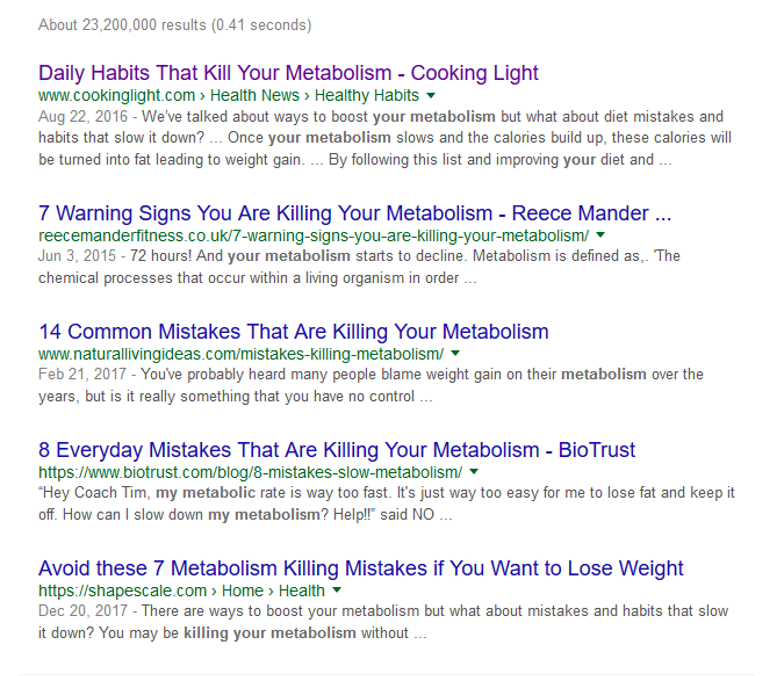
Health and Metabolism
Why the Killing Your Metabolism Slogan Misleading
Several (23.2 million based on my recent google search) health-based articles have focused on the things that are ‘killing your metabolism’:

Many of these authors have concluded that a low metabolism is hindering your weight loss goals. I am not opposed to many of the health recommendations within these popular articles, but idealizing a fast metabolism is not a healthy approach. Within this article I will clarify the meaning behind popular recommendations and explain why the ‘killing your metabolism’ slogan is misleading. Finally, I will make a case for appreciating a lower metabolic rate and remaining physically active which both play key roles in optimizing your long-term health.
Consistently Practice a Great Night Sleep
Many popular articles recommending the ‘metabolism boost’ make a solid argument for a great night sleep. Sleep is undoubtedly important for a healthy mind and body. Individuals who do not get enough sleep are likely to be groggy the next day, and this may slightly decrease their resting metabolic rate. However, this slight decrease in the resting metabolic rate is not enough for relevant weight gain issues to be considered. The more appropriate label for chronic sleep deprivation should be titled ‘metabolic dysregulation’. Studies have confirmed reduced glucose tolerance rates, reduced insulin response to glucose, and increased proinflammatory markers in sleep deprived individuals. The take home message is that metabolic dysregulation is not a simple drop in your metabolism. These issues cannot be corrected by a cup of coffee or short-term exercise plan to re-boost your metabolism. Allowing your body to fully repair itself with a great night sleep is crucial for optimal health.
Build and Sustain Stronger Muscles
Resistance training is another common recommendation in metabolism booster articles. I am also in complete agreement with this recommendation for more resistance training to build stronger muscles. Publications have confirmed that more muscle mass and a lower BMI may slightly increase your resting metabolic rate, but the minor increase is often over praised. What should be valued is the fact that the consistent practice of weightlifting increases your metabolic rate substantially when you are weightlifting. Furthermore, the muscle tearing and rebuilding process of resistance training increases your metabolic rate for 0-2 hours after the training ends, and that increase is still notable up to 48 hours after the resistance training ends. Rather than hoping for a long-term weight loss miracle with more muscle mass, making resistance training a consistent routine is required for long-term benefits.
Avoid Processed Foods
Processed foods do not necessarily lower your resting metabolic rate. In fact, several processed foods, especially those loaded with caffeine or other stimulants will undoubtedly increase your resting metabolic rate. Regardless of the specific metabolic effect of the processed food, it is in your best interest to avoid the biochemical manipulation.
Consistently eating processed foods, especially foods which are high in sugar and refined carbohydrates, is extremely taxing on the body. This requires the body to generate high quantities of insulin to digest these sugars. When too much sugar is eaten, the body resorts to converting this excess energy to fat and storing it throughout the body. Eventually, the body may become overwhelmed by the consistent demand for insulin. If that is the case, a diabetes diagnosis is soon to follow.
The resting metabolic rate for diabetes patients is higher than average, especially when medications or dietary practices have not achieved adequate control of blood sugar levels. Additional studies have confirmed resting metabolic rates also increase with obesity, and when paired with diabetes the increase is even greater. This metabolic ‘boost’ is inevitable as the body continues to scavenge for solutions to regulate blood glucose (A1C) levels. The increased metabolic rate is caused by the body being internally overworked.
Avoid Metabolism Boosting Supplements
The misleading ‘Killing Your Metabolism’ slogan is the perfect gateway for great metabolism booster promotions. Whether the goal is to optimize workout performance or stay awake at your job, the metabolism booster products have already been targeted in your direction. Soft drinks have been around for more than 100 years, and high quantities of sugar and caffeine in these soft drinks have given their clients a thrilling short-term metabolism boost. Additional heavily marketed metabolism boosters include capsaicin (hot peppers), Arginine (a natural amino acid), L-carnitine (a natural amino acid derivative), chromium picolinate (a natural mineral), and conjugated linoleic acid (a lab synthesized mixture of cis and trans fatty acids). I would not make an argument against eating small quantities of any of these products from a natural food source, but consistently overloading the body with any of these products will undoubtedly cause unwanted stress. Using external supplements to stimulate hyperactivity within your body is not a healthy muscle-building or weight loss solution.
Be More Physically Active
Since the metabolism boost promotions may still be lingering in your mind, I need to clarify that a lower resting metabolic rate often means that your body is operating efficiently. You are healthier if you have a low resting metabolic rate because there is not a taxing health issue which your body is striving to heal or correct. You are free to apply your body to whatever adventures you are willing to take, and the more physical adventures you take (unless you consistently overdo things and break plenty of bones like I have), the healthier you will be. Research articles describe physical activity as energy expenditure (EE) practices. Data in these research articles clearly show that more physical activity directly correlates with a longer lifespan, better health, and a lower resting metabolic rate.
Conclusion
Rather than hijacking your metabolism with expensive boosters and quick fixes, the better option would be to allow your body to exist in a peaceful and healthy state. This is reached and maintained with a consistent practice of sleep, resistance training, eating nutrient dense foods, and physical activity.
Let me know what you think within the comments area below!
References
- Sharma, S., & Kavuru, M. (2010). Sleep and Metabolism: An Overview. International Journal of Endocrinology, 2010, 270832. https://doi.org/10.1155/2010/270832
- McMurray, R. G., Soares, J., Caspersen, C. J., & McCurdy, T. (2014). Examining Variations of Resting Metabolic Rate of Adults: A Public Health Perspective. Medicine and Science in Sports and Exercise, 46(7), 1352–1358. http://doi.org/10.1249/MSS.0000000000000232
- Alawad, A. O., Merghani, T. H., & Ballal, M. A. (2013). Resting metabolic rate in obese diabetic and obese non-diabetic subjects and its relation to glycaemic control. BMC Research Notes, 6, 382. https://doi.org/10.1186/1756-0500-6-382
- K J Acheson, B Zahorska-Markiewicz, P Pittet, K Anantharaman, E Jéquier; Caffeine and coffee: their influence on metabolic rate and substrate utilization in normal weight and obese individuals, The American Journal of Clinical Nutrition, Volume 33, Issue 5, 1 May 1980, Pages 989–997, https://doi.org/10.1093/ajcn/33.5.989
- Manini, T. M. (2010). Energy Expenditure and Aging. Ageing Research Reviews, 9(1), 1. http://doi.org/10.1016/j.arr.2009.08.002
- Jumpertz, R., Hanson, R. L., Sievers, M. L., Bennett, P. H., Nelson, R. G., & Krakoff, J. (2011). Higher Energy Expenditure in Humans Predicts Natural Mortality. The Journal of Clinical Endocrinology and Metabolism, 96(6), E972–E976. http://doi.org/10.1210/jc.2010-2944